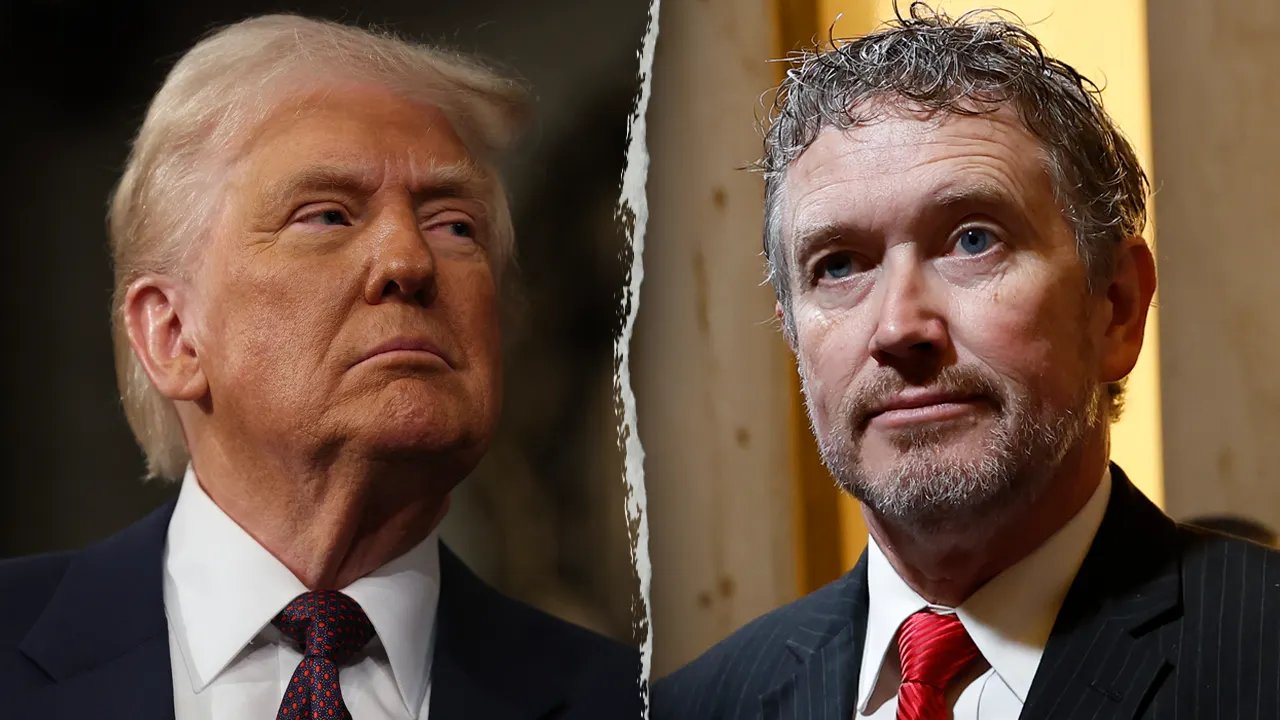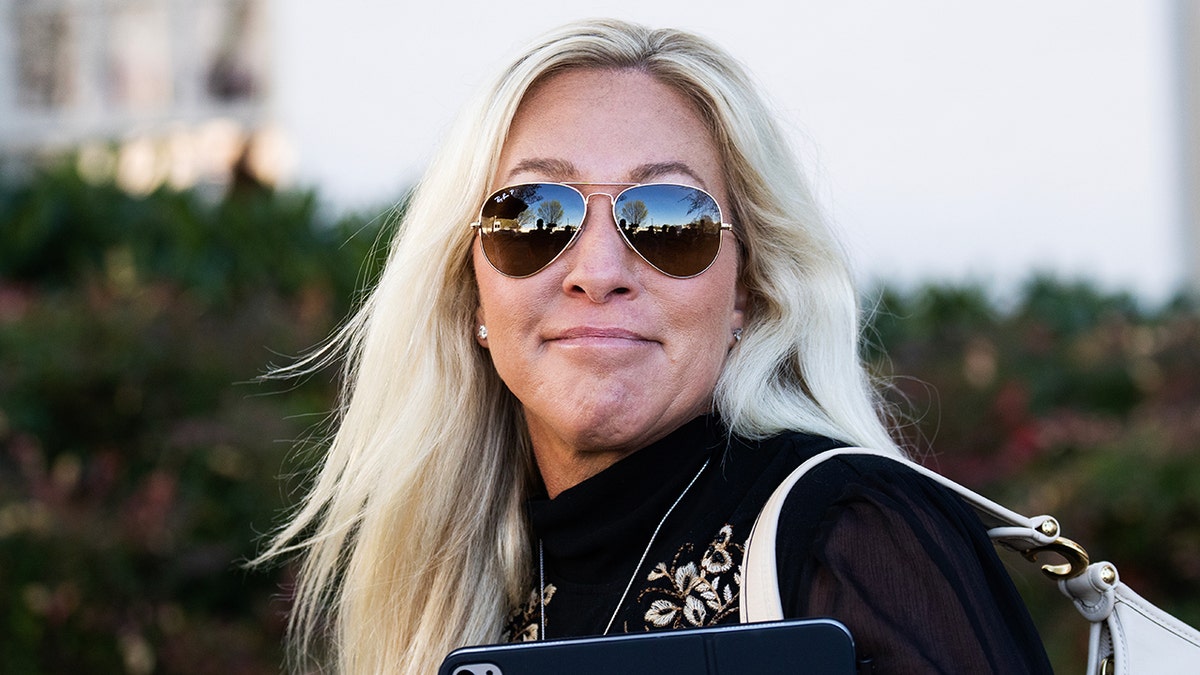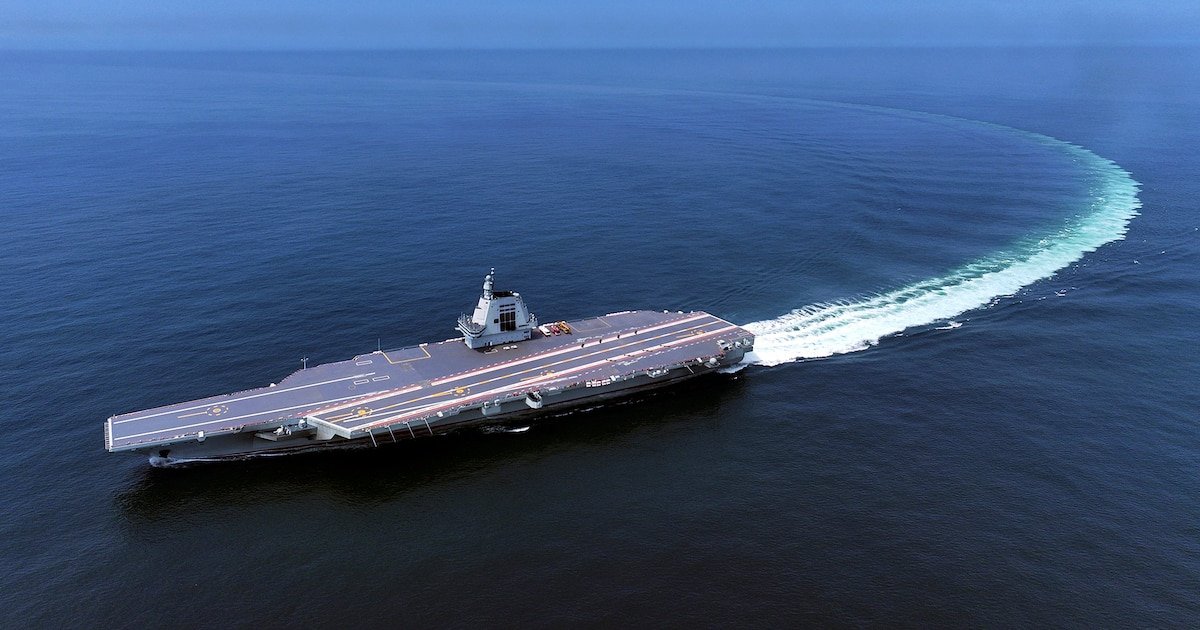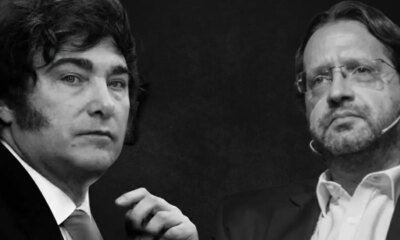INTERNACIONAL
‘Not constitutional’: Congress evokes new War Powers Resolution to reject Trump’s strikes on Iran

NEWYou can now listen to Fox News articles!
Co-sponsors of the War Powers Resolution, Reps. Ro Khanna, D-Calif, and Thomas Massie, R-Ky., were quick to criticize President Donald Trump for greenlighting attacks on three nuclear sites in Iran Saturday night.
«This is not constitutional,» Massie said, responding to Trump’s Truth Social post announcing the strikes on Fordow, Natanz and Isfahan in Iran.
The bipartisan War Powers Resolution was introduced in the House of Representatives this week as strikes between Israel and Iran raged on, and the world stood by to see if Trump would strike.
Sources familiar told Fox News Digital that both House Speaker Mike Johnson, R-La., and Senate Majority Leader John Thune, R-S.D., were briefed on the strikes ahead of time.
‘INSTINCTS FOR RESTRAINT’: SENATE DIVIDED OVER WHO GETS TO DECLARE WAR
President Donald Trump speaks during an address to a joint session of Congress at the Capitol in Washington, D.C., on March 4, 2025; Rep. Thomas Massie (R-KY) (L) attends the inauguration of President-elect Donald Trump in the Rotunda of the Capitol on Jan. 20, 2025 in Washington, D.C. (Left: WIN MCNAMEE/POOL/AFP via Getty Images; Right: Kevin Dietsch/Getty Images)
«Trump struck Iran without any authorization of Congress. We need to immediately return to DC and vote on @RepThomasMassie and my War Powers Resolution to prevent America from being dragged into another endless Middle East war,» Khanna said.
‘SQUAD’ MEMBERS, GOP LAWMAKER JOIN FORCES TO REJECT US INVOLVEMENT IN ISRAEL-IRAN WAR
This week, lawmakers sounded off on the unconstitutionality of Trump striking Iran without congressional approval. Congress has the sole power to declare war under Article I of the Constitution.
The War Powers Resolution seeks to «remove United States Armed Forces from unauthorized hostilities in the Islamic State of Iran» and directs Trump to «terminate» the deployment of American troops against Iran without an «authorized declaration of war or specific authorization for use of military forces against Iran.»
As Trump announced his strikes against Iran – without congressional approval – Khanna said representatives should return to Capitol Hill to prevent further escalation.
And in the upper chamber, Sen. Tim Kaine, D-Va., introduced his own war powers resolution ahead of the bipartisan duo in the House. While the resolution had been gaining steam with his colleagues, momentum could be stalled due to the strikes. His resolution is privileged, meaning that lawmakers will have to consider it. The earliest it could be voted on is Friday.

President Donald Trump speaks with reporters while flying aboard Air Force One en route from Calgary, Canada to Joint Base Andrews, Md., late Monday, June 16, 2025. (AP Photo/Mark Schiefelbein)
Kaine argued in a statement that «the American public is overwhelmingly opposed to the U.S. waging war on Iran.»
«And the Israeli Foreign Minister admitted yesterday that Israeli bombing had set the Iranian nuclear program back ‘at least 2 or 3 years,’» he said. «So, what made Trump recklessly decide to rush and bomb today? Horrible judgment. I will push for all senators to vote on whether they are for this third idiotic Middle East war.»
This week on Capitol Hill, Massie, the conservative fiscal hawk who refused to sign onto Trump’s «big, beautiful bill,» built an unlikely bipartisan coalition of lawmakers resisting the U.S.’ involvement in the Middle East conflict.
«This is not our war. But if it were, Congress must decide such matters according to our Constitution,» Massie said.
Massie, whom Trump threatened to primary during the House GOP megabill negotiations, invited «all members of Congress to cosponsor this resolution.» By Tuesday night, the bipartisan bill had picked up 27 cosponsors, including progressive «Squad» members Reps. Alexandria Ocasio-Cortez and Ilhan Omar.
Across the political aisle, Rep. Marjorie Taylor Greene, R-Ga., signaled her support, writing that Americans want an affordable cost of living, safe communities and quality education «not going into another foreign war.»

Rep. Marjorie Taylor Greene, R-Ga., leaves the Capitol Hill Club after a meeting of the House Republican Conference on Tuesday, March 25, 2025. (Tom Williams/CQ-Roll Call, Inc via Getty Images)
«This is not our fight,» Greene doubled down on Saturday night, before Trump’s Truth Social announcement.
The bill’s original co-sponsors also include progressive Democrat Reps. Pramila Jayapal, Summer Lee, Ayanna Pressley and Rashida Tlaib, who called it unconstitutional for «Trump to go to war without a vote in Congress.»
White House Press Secretary Karoline Leavitt said Thursday that Trump would make his decision about whether to bomb Iran within two weeks.
«We have completed our very successful attack on the three Nuclear sites in Iran, including Fordow, Natanz, and Esfahan. All planes are now outside of Iran air space. A full payload of BOMBS was dropped on the primary site, Fordow. All planes are safely on their way home. Congratulations to our great American Warriors. There is not another military in the World that could have done this. NOW IS THE TIME FOR PEACE! Thank you for your attention to this matter,» Trump said Saturday night.
CLICK HERE TO GET THE FOX NEWS APP
Israel launched preemptive strikes on Iran’s nuclear facilities and military leaders last week, which the Islamic Republic considered a «declaration of war.» Strikes between Israel and Iran have raged on since, as Trump said he was considering whether to sign off on U.S. strikes against Iran.
The Jewish State targeted Iran’s nuclear capabilities after months of failed negotiations in the region and heightened concern over Iran developing nuclear weapons.
But Ali Bahreini, Iran’s ambassador to Geneva, said Iran «will continue to produce the enriched uranium as far as we need for peaceful purposes,» as Israel, and now the U.S., have issued strikes against Iran’s nuclear capabilities.
INTERNACIONAL
Tensión en Asia: el régimen chino realizó nuevos ejercicios militares en el mar de China Meridional

El Ejército chino realizó ejercicios «aéreas y navales” en el mar de China Meridional entre el 2 y el 6 de febrero, en respuesta a los maniobras conjuntas organizadas el mes pasado por Filipinas y Estados Unidos en la región.
Zhai Shichen, portavoz del Comando del Teatro Sur del Ejército Popular de Liberación (EPL), acusó a Filipinas de aliarse con “países ajenos a la región” para llevar a cabo “patrullas aéreas bilaterales” que, según afirmó, “socavan la paz y la estabilidad regionales”.
El vocero del régimen aseguró que las fuerzas chinas “permanecerán en estado de máxima alerta” y defenderán “con firmeza la soberanía territorial de China y sus derechos e intereses marítimos”, sin ofrecer detalles sobre los medios empleados en las patrullas.
Estas maniobras siguieron a ejercicios similares realizados por China entre el 25 y el 26 de enero, después de que Filipinas y Estados Unidos organizaran una navegación conjunta en el arrecife de Scarborough —conocido en China como Huangyan y en Filipinas como Bajo de Masinloc—, dentro de la zona económica exclusiva que Manila reclama.
Las autoridades filipinas calificaron la operación como la primera actividad marítima cooperativa bilateral entre ambos países en 2026 y la undécima desde finales de 2023. China reclama la soberanía casi total del mar de China Meridional, zona estratégica por la que circula cerca del 30% del comercio marítimo mundial y que cuenta con valiosos caladeros y potenciales reservas de hidrocarburos, frente a las reivindicaciones de Filipinas, Vietnam, Malasia y otros Estados ribereños.
En 2016, la Corte Permanente de Arbitraje de La Haya falló a favor de Filipinas en una disputa territorial, decisión que Beijing rechazó y decidió no reconocer. Desde que el presidente filipino Ferdinand Marcos Jr. asumió el cargo en 2022, Manila reforzó su cooperación en defensa con el país norteamericano, lo que coincidió con un aumento de las fricciones con el régimen de Xi Jinping en la región.
Estados Unidos ya había mostrado su apoyo en diciembre cuando condenó las acciones de la Guardia Costera china contra embarcaciones pesqueras filipinas en aguas disputadas del mar de China Meridional, incidente que dejó tres pescadores heridos tras el uso de cañones de agua y maniobras de bloqueo.
“Condenamos el uso de los cañones de agua por parte de China cerca del Sabina Shoal. Estas acciones agresivas ponen en peligro la vida de los pescadores filipinos, que buscan obtener su sustento”, señaló el Departamento de Estado en un comunicado.
El enfrentamiento se produjo cuando una veintena de embarcaciones pesqueras filipinas faenaban en las inmediaciones del mar. Según el portavoz del Servicio de Guardacostas de Filipinas, Jay Tarriela, los pescadores estaban “faenando dentro de la legalidad” cuando fueron atacados por dos buques de la Guardia Costera china.
En paralelo, desde Taiwán, el ministro de Defensa Koo Li-hsiung advirtió que la repetición de ejercicios militares chinos cerca de la isla puede insensibilizar a la población, aunque subrayó que la amenaza proveniente de Beijing es “urgente” y “existe de verdad”.
En declaraciones recogidas por la agencia CNA, Koo señaló que China realiza habitualmente “patrullas de aplicación de la ley” en aguas cercanas a las islas periféricas de Taiwán y alrededor de la línea media del Estrecho, buscando “crear la falsa apariencia” de que la zona pertenece a sus aguas internas.
El funcionario también alertó sobre riesgos en ciberseguridad, como “ciberataques e intrusiones” de hackers, y denunció el uso simultáneo de herramientas políticas, económicas, militares y psicológicas por parte de China para llevar a cabo una “guerra cognitiva” contra Taiwán.
“Cuando estas acciones se repiten constantemente, nos preocupa que puedan adormecer las defensas psicológicas de la población; en realidad, esta amenaza enemiga es urgente y existe de verdad”, enfatizó.
Koo aportó estadísticas que muestran un incremento en la actividad militar china: en 2025, aeronaves principales y de apoyo del Ejército Popular de Liberación cruzaron la línea media del estrecho e ingresaron en la Zona de Identificación de Defensa Aérea (ADIZ) taiwanesa en 3.764 ocasiones, frente a 3.066 el año anterior (aumento del 2%). Además, los buques de guerra chinos entraron en esa zona en 2.640 ocasiones, frente a 2.475 en 2024 (aumento del 7%).
(Con información de EFE)
Asia / Pacific
INTERNACIONAL
Calm amid chaos: Noem defies calls to resign, touts border victory as shutdowns, storms and riots swirl

NEWYou can now listen to Fox News articles!
Department of Homeland Security Secretary Kristi Noem has been a lightning rod for criticism amid anti-ICE riots that have rocked the country, sparked a government shutdown and left many wondering whether the nation’s eighth DHS secretary would keep her job.
Despite the mounting pressure, Noem appeared calm, collected and confident during a trip this week that included a stop in Mississippi to assess winter storm damage recovery efforts, visits to the southern border in Texas and Arizona as well as the northern border in North Dakota and a barbecue dinner hosted and served by Noem to Border Patrol agents in Arizona.
During the first half of the four-day stint, Congress was still dealing with a partial government shutdown largely over how to fund DHS. The House ultimately reached an agreement, funding the agency through Feb. 13, but Noem’s focus remained the same before and after the bill passed, and her schedule was left unchanged.
Secretary Kristi Noem speaks at a news conference along the border wall in Nogales, Ariz., Feb. 4. (DHS photo by Mikaela McGee)
During an exclusive interview along the border wall in Nogales, Arizona, Noem told Fox News Digital the national security functions of the agency are too vital to be sidelined by a spending fight.
BORDER CROSSINGS HIT 55-YEAR LOW — AFTER DEMOCRATS SAID REFORM WAS THE ONLY FIX
«Every day [DHS is] finding terrorists and removing them from our country, protecting our cybersecurity systems, our critical infrastructure,» Noem told Fox. «Only 11% of the DHS budget is ICE. The rest of it is FEMA, TSA, that runs our security checkpoints at our airports.
«It is also the Coast Guard, which is absolutely critical to our maritime protection and also partnering with the Department of War,» Noem added. «We have weapons of mass destruction, science and technology, our national labs.
«We have a lot of responsibilities that we absolutely need to fund in order to do them properly. So, I’m hopeful that Congress will recognize that and pass this bill quickly.»
KRISTI NOEM TO TESTIFY BEFORE HOUSE COMMITTEE NEXT MONTH
But the debate over government spending wasn’t about the Coast Guard, FEMA or TSA. It was almost entirely based on one of the 23 agencies Noem oversees, Immigration and Customs Enforcement, or ICE. Specifically, it centered around ICE’s actions in Minneapolis, a so-called sanctuary city in which local authorities provide only minimal support to federal officers enforcing immigration laws.

Federal law enforcement agents detain a demonstrator during a raid in south Minneapolis Jan. 13, 2026. (Victor J. Blue/Bloomberg via Getty Images)
Since the beginning of the year, DHS estimates that Operation Metro Surge has resulted in the apprehension of 4,000 criminal illegal migrants in Minneapolis. The operation was launched mainly due to a fraud scheme that involved members of the Somali community in Minnesota.
The mission then evolved into a heated clash between agitators and federal officers that ultimately left two U.S. citizens dead, Renee Good and Alex Pretti, both killed by federal immigration agents.
NOEM VOWS CRIMINAL PROSECUTION AFTER CATCHING ALLEGED DHS ‘PROLIFIC LEAKER’
Noem quickly labeled both Good and Pretti «domestic terrorists» and said their deaths were due to impeding «law enforcement operations,» sparking outrage from Democrats and some Republicans who began to call for her resignation.
Rumors swirled whether Noem would resign or if President Donald Trump would fire her, but the president told reporters shortly after the death of Pretti he had no intention of relieving her from her position as head of DHS.
When Fox News Digital asked Noem what she believed the American people want when it comes to ICE enforcing the law using the same tactics that led to riots, deaths and assaults on both agitators and agents, Noem said, «I think people would want less conflict.»

President Donald Trump has repeatedly backed DHS chief Noem in public comments in January. (Jim Watson/Getty Images)
LEAVITT SAYS TRUMP WILL NOT ‘WAVER’ ON ILLEGAL IMMIGRATION CRACKDOWN DESPITE DEMOCRATIC BACKLASH
«[The American people] want to know that we’re enforcing our laws and that we are going after dangerous criminals, and they don’t want them to be released on the streets to perpetuate more crimes,» Noem explained.
At some stops along Noem’s trip, agitators appeared. At a dinner she hosted inside a hotel in Tucson, Arizona, for CBP officers, protesters with drums, megaphones and seemingly pre-made signs gathered at the entrance of the hotel. Every other car traveling by the demonstration honked, though it’s unclear whether they were honking in support or in disagreement with the protesters.
A Quinnipiac University survey taken from Jan. 29 to Feb. 2 showed 58% of those questioned say Noem shouldn’t have her job.
DHS SECRETARY NOEM STANDS BY BODY CAMERA REQUIREMENT FOR FEDERAL AGENTS FOLLOWING TRUMP COMMENTS
Fox News Digital spoke with a GOP insider who pointed to Noem’s inexperience on the national stage, saying her time as governor of South Dakota didn’t prepare her for one of the most challenging roles in the presidential cabinet.

Department of Homeland Security Secretary Kristi Noem meets with CBP officials at Eagle Pass, Texas, Feb. 3, 2026. (Kat Ramirez for Fox News Digital)
Despite the critics, Noem’s record on securing the border has proven successful, according to figures provided by the department and the Trump administration. Trump’s goal to deter illegal migrants from crossing the border, which was Noem’s mandate, has been a priority for the White House.
More illegal migrants crossed the southern border in one average month under former President Biden’s watch than have crossed under Noem’s entire watch, according to DHS.
NOEM DEPLOYS TO BOTH BORDERS, SAYS ICE WON’T BE DETERRED BY SANCTUARY OFFICIALS WHO ‘WANT TO CREATE CONFLICT’
«We have over 3 million people that have deported, and that includes probably about 700,000 that we have detained and removed,» Noem told Fox News Digital Wednesday. «Beyond that, over 2.3 million have self-deported.
«You know, you send the message around the world that America is now going to be enforcing its laws and making sure that if you’re in this country illegally, that you should go home, and we’ve been incentivizing that through a $2,600 payment and a flight,» Noem added. «Millions of people have taken us up on that.»
Trump defended Noem for a second time during remarks at the National Prayer Breakfast Thursday when discussing whether he would relinquish her command at DHS.

Department of Homeland Security Secretary Kristi Noem (not pictured) displays a footage of photos showing illegal border crossings a year ago as she meets with CBP officials at Eagle Pass, Texas, Feb. 3, 2026. (Kat Ramirez for Fox News Digital)
HOUSE DEMOCRATS HOLD ‘SHADOW HEARINGS’ AS THEY BUILD CASE TO IMPEACH KRISTI NOEM
«Why would I do that? We have the strongest border in the history of our country,» Trump said. «We have the best crime numbers we’ve ever had going back to the year 1900. That’s 125 years. We have the lowest crime numbers.»
Trump also appointed Tom Homan, the former ICE director during Trump’s first term and the executive associate director of Enforcement and Removal Operations under President Barack Obama, to serve as border czar, a role previously held by Kamala Harris.
Some reports painted a picture of an unspoken rivalry between Homan and Noem after Trump’s decision to put Homan in command of the situation in Minneapolis.
NOEM SLAMS DEMS, BIDEN ADMINISTRATION FOR LACKING ‘COMPASSION’ AMID ANTI-ICE TENSIONS
But Noem told Fox News Digital she credited Homan for working to get local leaders in Minneapolis to come to the table and negotiate order in what has been a chaotic scene in the Twin Cities.

Homeland Security Secretary Kristi Noem speaks during a roundtable in the State Dining Room of the White House Oct. 8, 2025. (Demetrius Freeman/The Washington Post via Getty Images)
CLICK HERE TO DOWNLOAD THE FOX NEWS APP
«What people need to remember is that Democrat policies were destroying our country,» Noem said. «And President Trump came in and said, ‘I’m going to protect the American people. It’s not going to happen anymore.’
«Since [the Biden administration], thousands of people’s lives have been saved just here, just right here on the border, because those migrants are not victimized anymore.»
Preston Mizell is a writer with Fox News. Story tips can be sent to Preston.Mizell@fox.com and on X @MizellPreston
immigration,illegal immigrants,migrant crime,minneapolis st paul,minnesota,homeland security,kristi noem
INTERNACIONAL
Cuba empieza a cerrar hoteles y reubicar turistas ante la crisis por la falta de combustible

El gobierno de Cuba ha empezado a cerrar algunos hoteles de la isla y a trasladar a los turistas a otras instalaciones como parte del paquete de medidas adoptado ante el asedio petrolero de Estados Unidos, confirmaron este sábado fuentes del sector.
El viceprimer ministro Oscar Pérez-Oliva Fraga aseguró el viernes en la televisión estatal que «se ha diseñado un plan en el turismo para reducir los consumos energéticos, compactar las instalaciones turísticas, y aprovechar la temporada alta que está transcurriendo en estos momentos en nuestro país».
El también titular del Comercio Exterior y la Inversión Extranjera no especificó detalles sobre esta compactación de la infraestructura turística, pero las fuentes -que prefirieron el anonimato- adelantaron a la agencia EFE que desde el viernes se están cerrando hoteles y reubicando a los turistas internacionales en otros centros.
Esto afecta principalmente a algunas instalaciones turísticas ubicadas en el balneario de Varadero (oeste) y de los cayos del norte de la isla.
Entre las principales cadenas hoteleras que operan en Cuba están las españolas Meliá e Iberostar, y la canadiense Blue Diamond, entre otras.
El sector turístico en Cuba, considerado en un tiempo locomotor de la economía, confirmó en 2025 su crisis al cerrar con su peor registro de viajeros internacionales (1,8 millones) desde 2002, sin contar los años de la pandemia de covid-19.
La cifra no llega como sorpresa -en el primer semestre, la tasa de ocupación hotelera registró un descenso anual de siete puntos porcentuales (21,5 %)-, pero sí confirma la caída en picada del turismo en los últimos siete años.
Canadá, con 754.010 personas, y Rusia, con 131.882, fueron los dos principales mercados emisores de visitantes el año pasado, según los datos oficiales, pero con caídas interanuales del 12,4 y del 29%.
El descenso comenzó luego de 2018, cuando la isla alcanzó su récord histórico de turistas: 4,7 millones en un ejercicio. Cuba venía de los años del deshielo con los Estados Unidos del presidente Barack Obama.
Después llegaron las medidas de su sucesor, Donald Trump, durante su primer mandato. A las sanciones se le sumaron la pandemia (que congeló el sector por casi dos años) y la grave crisis económica y energética que sufre el país -y que repercute en los servicios y la experiencia- y el recorte de rutas aéreas.
El turismo es fundamental para los planes de recuperación económica del gobierno cubano, por su aporte al producto interno bruto (PIB) y por la entrada de divisas que representa, que habitualmente figura entre las más importantes, junto con los servicios profesionales y las remesas.
Cuba sufre una grave crisis energética desde mediados de 2024 por las frecuentes averías de sus obsoletas centrales termoeléctricas y la falta de divisas para importar los combustibles necesarios para nutrir la generación distribuida.
La operación militar estadounidense en Caracas del 3 de enero, que llevó a la captura del autócrata Nicolás Maduro, significó para La Habana, además del golpe a un aliado regional clave, el fin de suministro energético vital para la isla.
Luego, el presidente de EE.UU., Donald Trump, aumentó la presión al firmar el 29 de enero una orden ejecutiva que amenaza con aranceles a los países que le vendan petróleo a la isla.
Para enfrentar este escenario, el gobierno de Miguel Díaz-Canel puso en marcha el plan de emergencia ante el desabastecimiento de combustible que abarca también racionar la venta de combustible, priorizar el teletrabajo e implementar clases semipresenciales en las universidades.
Este paquete anticrisis toma como referencia las indicaciones del ex presidente Fidel Castro durante el llamado Período Especial, por la depresión que supuso para la isla la caída del bloque soviético.
Al anunciarlo el jueves, el presidente Díaz-Canel rescató el concepto de opción cero, el plan de supervivencia planteado en los noventa ante el escenario de cero petróleo.
Esta situación implicaba un racionamiento extremo, el uso de tracción animal, carbón vegetal para cocinar y transporte no motorizado y la autosuficiencia alimentaria.

 CHIMENTOS3 días ago
CHIMENTOS3 días agoFlor de la V contó las dificultades que vivió junto a Pablo Goycochea cuando se conoció su romance: “Había una persecución”

 ECONOMIA3 días ago
ECONOMIA3 días agoMilei dejó trascender que Lavagna quería un índice de inflación más alto porque «jugaba para Massa»

 ECONOMIA2 días ago
ECONOMIA2 días ago¿La revancha de Don Chatarrín?: acuerdo Trump-Milei puede favorecer a Rocca ante el avance asiático













